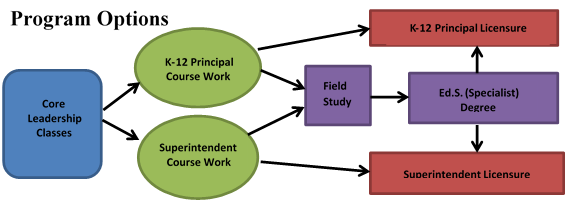Education Specialist & Licenses
After completing a Master’s Degree, (the MS need not be in Education Leadership), a student continuing their formal education can chose between obtaining a:
- License as a K-12 Principal or Superintendent
- Education Specialist Degree (EdS) with an emphasis in K-12 Principal or Superintendent
- Both a license and a degree
The license and degree share a common core of content courses for the K-12 Principal and Superintendent emphases, but the Education Specialist Degree has the additional requirement of completing a Field Study.
The Education Specialist Degree requires 6 credits for which the candidate conducts original research (called a Field Study) and shares their results with a faculty panel. A wide range of professional activities qualify as research and the department accepts a variety of products (publications, presentations, curriculum studies, policy analysis, action research, survey analysis, analysis of existing data, etc.).

The two options overlap considerably but differ in their intent.
| Licensure is competency based, regulated and awarded by the Minnesota Board of School Administrators (BOSA) and is affiliated with the MN Department of Education, and the Minnesota legislature. Licensure is intended to prepare you to be a practitioner (school leader) with the authority and responsibility entrusted to the position. | The Education Specialist Degree is awarded by Winona State University and signifies an academic accomplishment, showing interest in scholarly pursuits, the ability to better understand the world of school and the organized preparation for youth and organizational leadership. |
Administrative Licensure Requirements
The Education Leadership Program at Winona State University is an approved program by the Minnesota Board of School Administrators and can be used to meet the requirements (endorsement) for licensure as a K-12 Principal and/or Superintendent in Minnesota and Wisconsin. Licensure can be earned before or in lieu of completing the EdS degree requirements. Our program of study complies with Minnesota statute (MR3512) and is accessible to the public. Completing the coursework and internships and satisfactorily passing the Licensing Review Panel earns the candidate an endorsement for the license. The candidate then must make application to the State Department of Education in each state for their actual license. Initial licensure requires that you:
- Apply for admission into the EdS degree program (actually earning the degree is optional)
- Complete a minimum of 30 credits beyond the MS (and fulfilling the required coursework)
- Have completed three years of teaching experience at the elementary or secondary level while holding a teaching license valid for the position or positions in which the experience was gained [an alternative route is permitted requiring a 1050 hour Teaching Internship]
- Complete six semester credits of internship (320 hours) with a site supervisor appropriately licensed in the licensure area you are interested in
- Demonstrate knowledge of administrative and leadership competencies to the satisfaction of a joint faculty/administrator panel (at WSU this is called the Licensure Review Panel). Educational requirements for licensure in other states for administrative positions may be satisfied by specific program modifications
Education Specialist (EdS) Requirements
The Education Specialist Degree (EdS) from Winona State University requires the candidate to complete all of the expectations of licensure and additionally complete a field study. If the degree is pursued in conjunction with licensure the state requirements of: 3 years of teaching experience; two internships at K-12 schools and the Licensing Review Panel are expected. If the EdS degree is desired without pursuing licensure these three requirements do not need to be met.
The EdS degree is considered a terminal degree-- that is, for someone not intending to pursue a doctorate. Because it can be completed while obtaining licensure as a K-12 Principal or Superintendent it is seen by some as a meaningful accomplishment and a way to separate oneself from the crowd. The personal involvement in research (completing the field study), is intended to prepare the candidate for the meaningful analysis and deeper understanding of school, program or district activities.
The field study is the significant additional requirement for the EdS degree. This is a scholarly activity intended to immerse the candidate in research methodology, the scientific method and data collection and analysis. Students study various approaches to answering a research question and then, with their own question:
- Learn about how others have answered the question
- Develop their own method for collecting data and identify a meaningful sample group
- Collect data and analyze it
- Formally write up the findings and report them to a committee for discussion
Research projects are often conducted at the candidate’s school and are of personal and organizational benefit. Past field studies have looked school grading systems, staff evaluation practices, RtI implementation, the behavior of committee members and the merit of class size restrictions. The goal is to have candidates roll up their sleeves and get formally involved in real research which has meaning to them.

